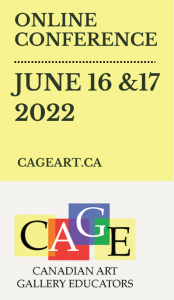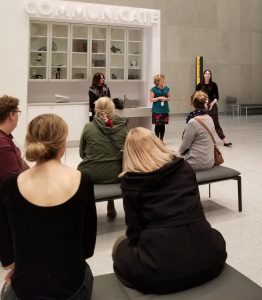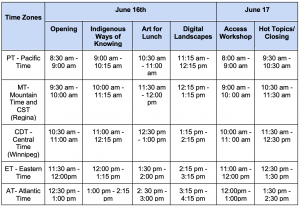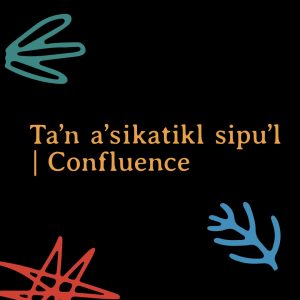
 CAGE Online Conference June 16 & 17, 2022
CAGE Online Conference June 16 & 17, 2022
The program is FREE and open to individuals but highly recommended for art educators and those working in the museum or gallery sector.
REGISTER VIA ZOOM
DAY ONE
DAY TWO
Conference Schedule
DAY ONE
Indigenous Ways of Knowing
Art’s ability to teach us about ourselves, each other, and the world is a core value for art educators. With a primary focus on education, the curatorial approach to the exhibition, Ta’n a’sikatikl sipu’l | Confluence at the Art Gallery of Nova Scotia, aims to create a space where Indigenous art invites conversations that meet visitors where they are while offering moments of learning, reflection, and sharing.
Join co-curators Aiden Gillis (Indigenous Arts Programmer, Mi’kmaw and French) and Michael McCormack (Assistant Curator, Halifax settler) as they discuss the exhibition in reference to the newly released Indigenous Protocols for the Visual Arts document by CARFAC.
This presentation will highlight shifts in curatorial practice at the Art Gallery of Nova Scotia, noting successes and opportunities for growth, and will invite participants to ask questions and share their experiences.
Art for Lunch: Culinary creations to share!
Join us for a fun virtual lunch where conference participants have the chance to connect with one another and informally present their own edible pièce de resistance inspired by a favourite work of art from their Gallery or Museum. There are no rules or limitations. Your interpretation can be literal or otherwise. Be bold, be weird, be awesome, be amazing but- by all means- be there!
Navigating the Digital Landscape
How do we align our practice to allow for expanded digital and in-person offerings and diverse expectations as audiences return to our institutions? How does digital engagement impact the ways we build relationships? In this session, led by Dr. George Veletsianos (Professor & Canada Research Chair, Innovative Learning and Technology, Royal Roads University), we will examine online environments, discussing virtual pedagogical frameworks and the role of digital engagement in 2022.
Dr. George Veletsianos (Γιώργος Βελετσιάνος) was born and raised in Cyprus, and now lives in Victoria, BC, where he is Professor in the School of Education and Technology at Royal Roads University.
Dr. Veletsianos has been designing, developing, and evaluating digital learning environments for nearly 20 years. His research agenda is focused on addressing complex problems related to education and society, such as inequitable access and harassment that academics and knowledge workers are subjected to when they share their scholarship online. Because possible solutions to these difficult problems cut across multiple disciplines, his research has embraced collaboration, interdisciplinarity, and methodological pluralism.
His research agenda focuses on two strands: design, development, and evaluation of online and blended learning environments and the study of learning experiences and participation in emerging online environments. In this contexts, he studies learners’ and faculty experiences with online learning, flexible education, networked scholarship, and emerging technologies and pedagogical practices.
DAY TWO
Building your Accessible Programming Toolkit 
Working with vulnerable Communities? Build your Accessible Programming Toolkit with a one hour presentation on Trauma Informed Care: Building a Culture of Strength presented by the Crisis and Trauma Resources Institute.
Trauma is prevalent in our world and has an impact on many of the people we interact with, including those who engage with our organizations. Compassionate and trauma-informed care is essential to providing effective support and building sustainable services. Based on our book, A Little Book About Trauma-Informed Workplaces, this workshop explores five key principles to integrate a trauma-informed approach throughout the organization. By embracing these principles, participants can better contribute to the positive transformation of individuals and relationships affected by trauma. Becoming trauma-informed creates a sustainable foundation in any setting to promote strength, engagement, and healing.
Hot Topics
Facilitated by Susan Rome and Nicolle Nugent
This session will unpack highlights and challenges that are specific to our own practice as gallery educators. Through large and small group discussion, we will have the opportunity to share, reflect and learn from each other. Bring a burning question or issue that is important to you.
___________
Consider becoming a MEMBER today to take part in exciting bi-monthly discussions or events organized by CAGE art educators working in museums and galleries across Canada.
Student Membership – $30 (non-voting)
Individual Membership – $45 (1 vote)
Institutional Membership – $75 (2 votes)


